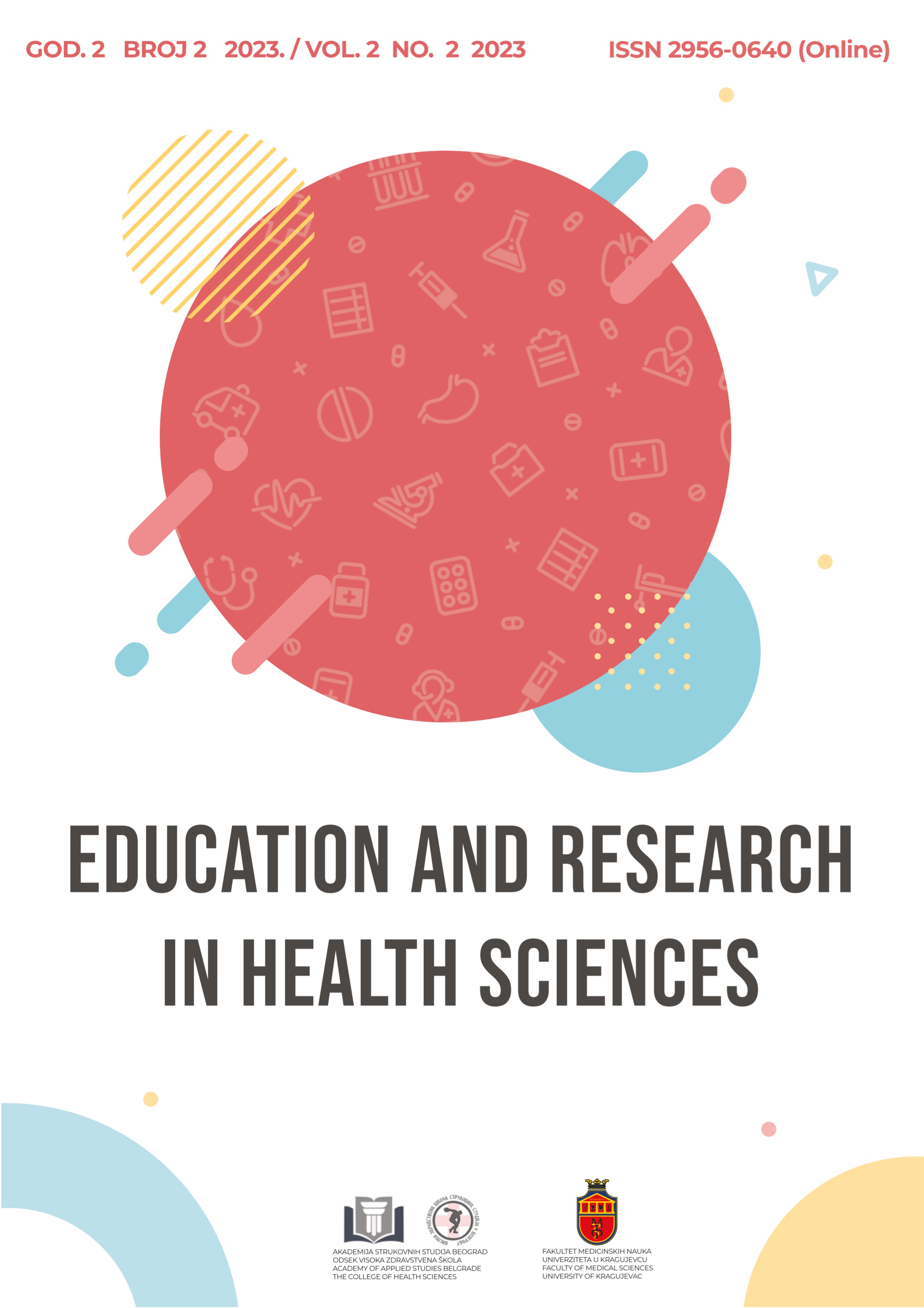Cooperation between the family and nurse educators - activities and satisfaction
Abstract
Introduction: Due to the weakened educational function of the modern family, one of the basic functions of preschool institutions is to supplement family education. Considering the importance of the partnership cooperation between educators and parents with the goal of the positive, spontaneous development of the child, in this paper we research ways of realizing cooperation, as well as the satisfaction of parents and educators with their mutual cooperation.
Objective: To examine the cooperation between preschool institutions and families and to determine to what extent parents and educators are satisfied with mutual cooperation.
Respondents and methods: The study consists of 30 nurse educators employed at the Preschool "Vračar" in Belgrade and 30 randomly selected parents whose children attend the same preschool. For the purposes of this research, two questionnaires were formulated, for parents and for educators, in order to find out their views.
Results: The results of the research show that educators estimate the greater interest of mothers in this cooperation compared to fathers, which takes place through several significant forms - individual conversation, PTA meetings, workshops. Individual conversation stands out as the most effective and most frequent form of cooperation. Furthermore, the results show that the percentage of parents' attendance at the group form of cooperation (PTA meetings and workshops) is satisfactory and that parents and educators are satisfied with mutual cooperation.
Conclusion: Based on the analyzed theoretical material and our research, we can conclude that the cooperation between families and nurse educators is satisfactory and that the best form of cooperation is individual discussion as well as PTA meetings. Improving communication skills of the nurse educators, as well as the permanent raising awareness of parents about the importance of active and continuous cooperation with preschool institutions, are key factors for the improvement of the researched process.
References
Klemenović J. Savremeni predškolski programi. Novi Sad: Savez pedagoških društava Vojvodine; 2009.
Vukomanović N, Kasagić Đ, Koruga D, Marković M, Pavlovski T, Cebić M. Roditelji u dečjem vrtiću. Sarajevo: Zavod za udžbenike i nastavna sredstva; 1989.
Pravilnik o predškolskom obrazovanju i vaspitanju ("Sl. glasnik RS", br. 18/2010, 101/2017, 113/2017 - dr. zakon, 95/2018 - dr. zakon, 10/2019, 86/2019 - dr. zakon, 157/2020 - dr. zakon, 123/2021 - dr. zakon i 129/2021)
Marković M, Šain M, Kovačević I, Danevski D, Pađan M. Korak po korak 1. Beograd: Kreativni centar; 2012
Jelić M, Stojkov I, Markov Z. Saradnja predškolske ustanove i roditelja iz ugla vaspitača. Specijalna edukacija i rehabilitacija 2018;17(2) 165-87. doi:10.5937/specedreh17-16592
Stanisavljević-Petrović Z. Saradnja porodice i vrtića. Niš: Autorsko izdanje; 1998.
Jovanović M. Saradnja porodice i dečjeg vrtića. Odabrane teme. Šabac: Visoka škola strukovnih studija za vaspitače Šabac; 2015.
Grandić R. Prilozi porodičnoj pedagogiji. Savez pedagoških društava Vojvodine; 2007.
Prodanović Lj. Saradnja prosvetnog radnika sa roditeljima. Beograd: Agencija za edukaciju i usluge “Profikomp”;2008.
El Nokali NE, Bachman HJ, Votruba-Drzai E. Parent involvement and children’s academic and social development in elementary school. Child Development. 2010;81(3) 988‒1005. doi: 10.1111/j.1467-8624.2010.01447.x
Reynolds AJ. Comparing measures of parental involvement and their effects on academic achievement. Early Childhood Research Quarterly 1992;7(3)441–62. doi:10.1016/0885-2006(92)90031-s
Arnold DH, Zeljo A, Doctoroff GL. Parent involvement in preschool: predictors and the relation of involvement to preliteracy development. School Psychology Review 2008;37(1)74‒90. doi: 10.1080/02796015.2008.12087910
Powell DR, Son, File, N, San Juan RR. Parentschool relationships and children’s academic and social outcomes in public school prekindergarten. Journal of School Psychology 2010;48(4) 269-92. doi:10.1016/j.jsp.2010.03.002
Serpell ZN, Mashburn AJ. Family-school connectedness and children’s early social development. Social Development 2011;21(1) 21‒46. doi:10.1111/j.1467-9507.2011.00623.x
Krnjaja Ž. Miškeljin L. Od učenja ka podučavanju. Beograd: Laćarak, AM Graphic; 2006.
Pirchio S, Tritrini C, Passiatore Y, Taeschner T. The role of the relationship between parents and educators for child behaviour and wellbeing. International Journal About Parents in Education 2013;7(2). 145‒55.

